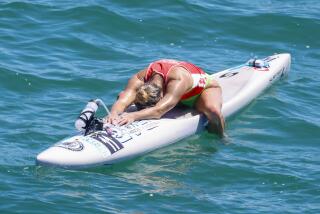The Hull Truth Is, This Can Be Costly : Sailing: Most entries in the Whitbread Round the World race have no sponsors, and officials are forbidding fund raising.
- Share via
FT. LAUDERDALE, Fla. — Officials of the Whitbread Round the World race picked this upscale waterfront oasis to issue a memo warning competitors they “will not be involved in any form of assistance to fund-raising activities for yachts.”
The memo continued, “Furthermore, the officials do not condone such activities as it demeans the stature of the race.”
And . . . “Syndicates are reminded that under local laws, fund raising in public places requires the permission of the appropriate authorities.”
Finally . . . “Any abuse of these principles could lead to the disqualification of the entry.”
So, crews on these 22 boats have sailed more than 28,000 miles in the most grueling conditions, dodging icebergs, running into whales and losing people overboard, and now they’re being told they could be thrown into jail or kicked out of the race for hustling to meet expenses.
Good thing Martela, a Finnish entry, withdrew after capsizing in February when its keel fell off. The committee would have been appalled to see it demean the race by sailing into port upside down.
“They would rather see everybody fully funded with a higher profile,” said Skip Novak, the American who has run the Soviet Union’s first big boat campaign on Fazisi.
The memo was signed by executive committee chairman J.D. Pritchard-Barrett, race committee chairman Rear Admiral C.B. Williams of the British Royal Navy and Ft. Lauderdale chairman W.A. Ketcham.
There were no such memos in ports such as Auckland, New Zealand or Fremantle, Western Australia.
“It’s never been an issue,” Novak said. “And in New Zealand we were certainly very visible on the dock. We were selling everything and signing things for two bucks, had a BMW we were raffling and people walking around with cardboard boxes asking people to dump money in. Basically, (we were) panhandling on the dock.”
Concurrent with the memo, a small poster offering tours of Fazisi for $10 was removed from display Friday.
However, the local chamber of commerce is helping out by sponsoring a local match race series between Fazisi and The Card of Sweden. The Card’s sponsor, MasterCard, is offering $2,500 to the winner of each race, and Fazisi is hoping to buy new sails by selling VIP crew positions to corporations for $20,000.
Some of the 23 starters were broke before they left Portsmouth, England, last Sept. 2 and have been sailing hand to mouth while sinking deeper into debt.
Money has been no problem for the heavily sponsored, fully funded boats, such as the New Zealand ketches Steinlager 2 and Fisher & Paykel, currently running one-two. Some of their crewmen are being paid $30,000.
Most on other boats aren’t being paid at all. Some are paying their way. Many took unpaid leave from their jobs. One--skipper Tracy Edwards of Maiden, the British all-woman boat--sold her house. Some hustle deals with supermarkets and other retailers in the various ports, just to make the next leg.
“Quite honestly, realism says that unless you have money you don’t win races at this level,” said Bob Salmon, the skipper of Liverpool Enterprise, a boat without a sponsor.
It appears Salmon will ignore the memo. Over the weekend, he was offering tours of the boat at dockside for donations.
Asked how much it takes to do a Whitbread, Salmon explained: “As much as you’ve got. We put on paper what it would cost, then we divided that by two, and we’ve since divided it by four.
“(We’re) spending less on the race than any other entry, by far. Our total costs will probably be in the region of $150,000 U.S. (dollars) . . . for food, for ongoing maintenance, interest to the bank--and that’s probably the biggest single drain, just servicing the bank. We’ve literally gone from day to day, as most charities do.”
By comparison, first-place Steinlager 2, financially afloat on a sea of beer, will spend about $5 million to win the race.
Salmon’s mission is to boost Liverpool, which itself has experienced hard times since the heyday of the Beatles, and perhaps pay off the boat and turn it into a training/adventure vehicle for youth.
“It’s basically a depressed industrial seaport (with the) reputation of being a tired old hub of the British Empire,” Salmon said. “It would be conceit to think this one thing would do very much, but each of us can do our own little bit.”
Paul McCartney, in nearby Miami for a concert, donated 40 tickets to be auctioned for the cause.
Some Liverpool businessmen own the boat. Salmon, 54, said: “I’m just the unpaid skipper.”
He gave up “my home life for three years. I have a heavy overdraft at the bank because I’ve had to personally carry some of the financial load. I’ve missed two years of watching the grandchildren grow up. Or, you could look at it the other way and say I’m just being selfish.”
The cause has touched some hearts--and wallets. One New Zealand couple, David and Loretta Mears--he a second-generation Brit, she a Maori opera singer with four doctorates in music--have led a fund-raising campaign for Liverpool Enterprise, following it to Ft. Lauderdale, where they organized a benefit raffle for a Jaguar XJ-6.
“They could identify with what we are trying to do, which is to take on the big boys with their money,” Salmon said.
Liverpool Enterprise is in 15th place. A similar British sloop, Creighton’s Naturally, is 16th.
Amid their other difficulties, race officials insisted that Liverpool Enterprise and Creighton’s Naturally move to their assigned, less accessible docks across the Intracoastal Waterway from the glitzy Pier 66 complex, where all the action is.
For Creighton’s Naturally, skipper John Chittenden, money has not been the heaviest burden. On the second leg through the Southern Ocean last November, he lost crewman Tony Phillips, 36. Chittenden, 49, and two partners bought the boat for $80,000 and spent twice that rebuilding it for the race.
“We bought a wreck,” he said. “This has taken two years of my time.”
They have $320,000 in sponsorship but will need another $560,000 to break even.
One scheme is to sell passages on the various legs for 12,000 pounds (about $19,200).
“They’re paying to be miserable,” Chittenden said.
Still, he added, “We’ve had to turn people down. We sailed the last leg with 23, which is about 10 more than we need.”
No number will ever replace Phillips.
“As far as I’m concerned, it means the race now is something I wish I hadn’t done,” Chittenden said.
Phillips and Bart van den Dwey were washed overboard in November when the boat broached (accidentally came broadside to the waves) in heavy, icy seas at 3 a.m. The crew fired white parachute flares and Van den Dwey, wearing a life vest and personal emergency beeper, was located unconscious after 30 minutes and saved. Phillips was found a few minutes later, but efforts to resuscitate him failed. Because he had a welt on his head and hadn’t inflated his jacket or activated his beeper, it was believed Phillips struck his head as he went overboard. “The ironic thing is I think we’d taken more precautions than anybody to avoid that (type of accident),” Chittenden said, referring to the vests, beepers and flares.
Novak, 37, also has had to deal with death on the voyage. Fazisi’s original co-skipper, Alexei Greschenko, hanged himself from a tree in a public park during the first stopover in Punta del Este, Uruguay.
“We don’t know why he committed suicide,” Novak said. “There were a lot of pressures. He had all the weight on his shoulders. When he got to England he didn’t speak a word of English, and everything was revolving around him. There was confusion. He hadn’t seen his wife and kids. His wife had just had a baby in June.
“Everybody was depressed and stressed out--myself and the rest of the crew included. But you’ve seen it before and you don’t think anyone’s going to commit suicide over a yacht race.”
However, it hasn’t been a lot of fun for Novak, either.
“The sailing’s been all right, but on shore it’s been very stressful,” he said. “Every time we arrive we’re broke and have to go out and try to raise money and make money and give talks to the Rotary Clubs and do whatever you have to do to get some cash to keep going. By the end of that you’re glad to get back to sea again.”
When a campaign to sail an American entry fell through, Novak, who heard the Soviet non-government trading company Fazis Moscow was mounting an effort, faxed the Soviets offering his help. He wound up showing them how to outfit the boat, then trained the crew, and Pepsi International provided limited sponsorship.
Then, around the time the race started, Pepsi decided not to pick up its option to continue sponsorship and left Fazisi high and dry.
“They were getting negative feedback from middle America (asking) why are they sponsoring the Soviet boat when they should be sponsoring an American boat, if they’re sponsoring one at all,” Novak said.
Since then, Fazisi has had to hustle funds wherever possible.
Now, Novak said, it may be time to send the Soviets on their way alone May 5 when the race starts the last leg back to Portsmouth.
“I’ll probably help them out here with the fund raising and then fly to the UK,” Novak said. “I’m writing a book on it and I’ve got a deadline in the middle of June.”
This is Novak’s fourth Whitbread, and maybe his last.
“It’s not the most enjoyable thing I’ve done, but it’s certainly the most interesting,” he said.
More to Read
Sign up for Essential California
The most important California stories and recommendations in your inbox every morning.
You may occasionally receive promotional content from the Los Angeles Times.













